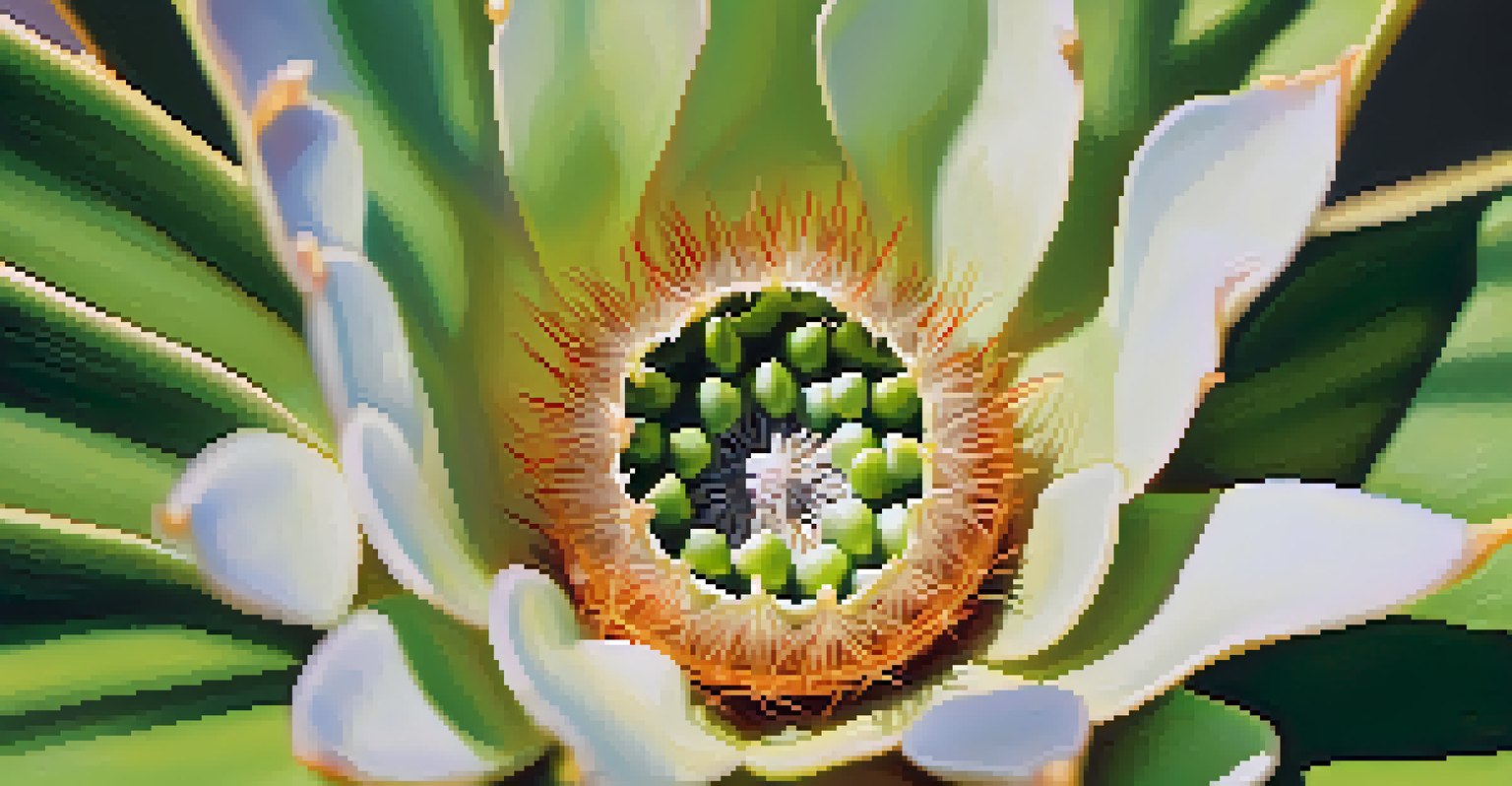Peyote, Legalization, and Indigenous Rights: A Complex Debate

Understanding Peyote and Its Cultural Significance
Peyote is a small cactus known for its psychoactive properties, primarily used in religious ceremonies by Indigenous peoples in North America. For centuries, it has played a crucial role in the spiritual and cultural practices of various tribes, particularly the Huichol and the Native American Church. The significance of peyote goes beyond its effects; it's a symbol of identity, resilience, and community for these groups.
Psychedelics are a tool for accessing the deeper parts of ourselves, and peyote has been an essential part of that journey for Indigenous peoples for centuries.
As society becomes more interested in psychedelics for mental health treatment and personal exploration, the conversation around peyote has intensified. Many are drawn to its potential benefits, yet they often overlook its sacred status among Indigenous communities. This raises important questions about respect, appropriation, and the commodification of cultural practices.
To truly appreciate the complexities surrounding peyote, one must recognize its deep-rooted connections to Indigenous identity. Understanding these cultural nuances is vital in any discussion about legalization and the rights of the communities that have historically used this cactus.
The Legal Landscape of Peyote Use
In the United States, peyote is classified as a Schedule I controlled substance, which means it is illegal to possess or use without specific exemptions. However, members of the Native American Church are legally allowed to use peyote in their religious ceremonies, highlighting a unique intersection of law and spirituality. This exemption, however, often leads to confusion and inconsistency in enforcement and understanding.

Outside of religious contexts, the push for broader legalization of peyote has started to gain momentum. Advocates argue that decriminalization would allow for more research into its potential therapeutic uses while respecting Indigenous sovereignty. Yet, this proposition raises concerns about the exploitation of peyote and the potential dilution of its cultural significance.
Peyote's Cultural Significance
Peyote is deeply woven into the spiritual and cultural fabric of Indigenous communities, representing identity, resilience, and community.
Legal discussions around peyote are often mired in complexities, balancing individual rights with communal traditions. As more states consider legalizing psychedelics, it's crucial to ensure that Indigenous voices are at the forefront of these conversations, shaping policies that affect their heritage.
Indigenous Rights and Sovereignty in the Debate
The debate surrounding peyote legalization is not just about the cactus itself; it intertwines with broader issues of Indigenous rights and sovereignty. Many Indigenous communities view the ownership and use of peyote as an extension of their cultural and spiritual rights. This perspective underscores the need for legal recognition that respects their traditions and practices.
The real question we should be asking is not whether we can use peyote, but rather, how we can honor and respect the cultures that have used it for millennia.
Historically, Indigenous peoples have faced significant challenges in preserving their cultural practices amidst colonization and assimilation policies. The fight for peyote rights is, therefore, part of a larger struggle for recognition and respect of their identities. Advocates emphasize that any discussions about peyote must include Indigenous voices to ensure their rights are honored and protected.
Furthermore, the legalization of peyote without Indigenous input could lead to scenarios where commercial interests overshadow traditional practices. This highlights the necessity for collaborative frameworks that prioritize Indigenous sovereignty and establish guidelines for the responsible use of peyote.
Challenges of Commercialization and Cultural Appropriation
As the conversation about peyote legalization expands, fears of commercialization loom large. The potential for profit-driven enterprises to exploit peyote could undermine its sacred status, turning a spiritual experience into a mere consumer product. This not only risks diluting the cultural significance but could also lead to overharvesting and environmental damage.
Cultural appropriation plays a significant role in this discussion, where non-Indigenous individuals or groups might exploit Indigenous practices without understanding their context. When peyote is commodified, it raises ethical questions about who gets to benefit from these traditional practices. Indigenous leaders often call for protective measures to prevent their traditions from being misused or misrepresented.
Legal Complexities of Peyote Use
The legal status of peyote in the U.S. is complicated, allowing use for religious purposes while raising concerns about broader legalization and Indigenous rights.
To navigate these challenges, it’s essential to foster respectful dialogues that center Indigenous voices. By prioritizing their perspectives, society can work towards solutions that honor both the cultural significance of peyote and the potential benefits it may offer to a broader audience.
Mental Health and the Therapeutic Potential of Peyote
In recent years, there has been a surge of interest in the therapeutic potential of psychedelics, including peyote, for treating mental health issues. Research suggests that substances like peyote may help alleviate symptoms of depression, anxiety, and PTSD. This growing body of evidence has sparked discussions about the broader implications of peyote use beyond religious contexts.
Proponents of peyote for therapeutic use emphasize the need for more research and a better understanding of its effects. However, it is crucial to approach this topic with sensitivity toward Indigenous practices and beliefs. The therapeutic conversation should not overshadow the spiritual and cultural importance of peyote for Indigenous communities.
Bridging the gap between traditional Indigenous uses and modern therapeutic applications could lead to innovative approaches in mental health treatment. However, this must be done with the utmost respect for Indigenous knowledge and practices, ensuring that their cultural significance is preserved while exploring potential benefits.
Finding Common Ground: Collaboration and Dialogue
To address the complex issues surrounding peyote, it is vital to foster collaboration between Indigenous communities, policymakers, and researchers. Open dialogues can help bridge the gap between traditional practices and contemporary interests, allowing for a more nuanced understanding of peyote’s significance. This collaborative approach can also help establish guidelines for respectful use that honors Indigenous rights.
Creating platforms for Indigenous voices is essential in shaping policies that affect their cultural practices. By involving Indigenous leaders and community members in the conversation, stakeholders can work towards solutions that respect their sovereignty while addressing the growing interest in peyote. This ensures that Indigenous knowledge and traditions remain central to any discussions about legalization.
Commercialization Risks
The potential commercialization of peyote poses significant risks of cultural appropriation and environmental harm, threatening its sacred status.
Ultimately, finding common ground requires a commitment to mutual respect and understanding. It’s about recognizing the historical injustices faced by Indigenous communities and working collectively towards solutions that honor their rights and cultural significance.
The Future of Peyote: Balancing Tradition and Change
As discussions surrounding peyote continue to evolve, the future of its use remains uncertain. Balancing the growing interest in legalization with the need to protect Indigenous rights presents a unique challenge. It’s essential to navigate this landscape thoughtfully, ensuring that any changes do not come at the expense of cultural traditions.
The path forward involves recognizing the importance of peyote to Indigenous identity while also considering its potential benefits for a broader audience. This dual approach allows for a more inclusive dialogue that respects both traditional practices and modern needs. By valuing Indigenous perspectives, society can work towards a future that honors heritage and explores new possibilities.

In conclusion, the debate around peyote, legalization, and Indigenous rights is complex but necessary. As we move forward, fostering understanding, collaboration, and respect will be crucial in shaping a future that honors both tradition and change.